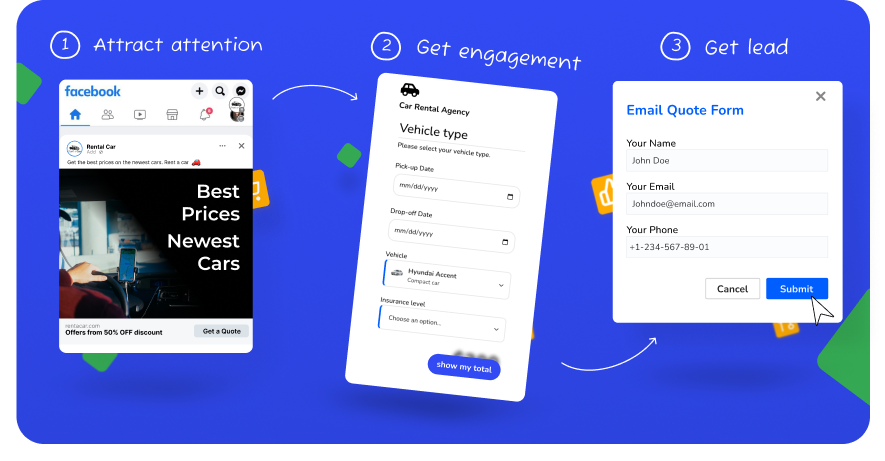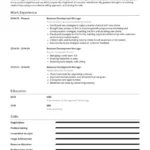
Generating leads is crucial for business growth. But measuring their quality can be tough.
A lead generation calculator helps you assess and optimize your lead generation efforts. In today’s competitive market, businesses rely on data-driven decisions. A lead generation calculator offers a clear way to measure your lead quality and quantity. This tool helps businesses understand which strategies work best, saving time and resources.
Knowing how to use a lead generation calculator can boost your marketing efforts. It can provide insights into your campaigns, showing where improvements are needed. In this post, we will explore the benefits and uses of a lead generation calculator. By the end, you’ll see how it can enhance your marketing strategy and drive better results.
Introduction To Lead Generation Calculator
A Lead Generation Calculator is a powerful tool for any business. It helps predict the number of leads your marketing efforts can generate. This tool can be a game-changer for your sales team, offering clear insights into potential leads.
Importance For Sales
Generating leads is crucial for any business. Leads are potential customers who show interest in your product or service. A Lead Generation Calculator helps forecast these leads. It guides your sales team to focus on the right prospects.
Knowing your potential leads can improve sales strategies. It can help allocate resources effectively. This can lead to higher conversion rates and increased revenue.
How It Works
The Lead Generation Calculator works by analyzing several factors. These factors include your website traffic, conversion rates, and marketing efforts.
Here is a simple breakdown of how it works:
- Input your website traffic data.
- Enter your conversion rates.
- Include your marketing efforts and budget.
The calculator will then process this data. It provides an estimate of potential leads. This estimate helps in planning your sales and marketing strategies.
Using a Lead Generation Calculator can save time. It helps in making data-driven decisions. This can lead to better outcomes for your business.

Credit: formidableforms.com
Key Features Of A Lead Generation Calculator
Understanding the key features of a lead generation calculator can help businesses make informed decisions. These tools are essential for evaluating potential leads and improving marketing strategies. In this section, we will explore the main features that make a lead generation calculator effective and valuable for your business.
Customizable Metrics
A good lead generation calculator offers customizable metrics. You can tailor the inputs to match your specific business needs. This feature allows you to focus on the data that matters most to your marketing goals. Customizable metrics ensure that the calculator provides accurate and relevant information. This adaptability helps businesses refine their lead generation efforts.
Real-time Data
Access to real-time data is crucial for any lead generation calculator. Real-time data allows you to make quick decisions based on the most recent information. This feature helps businesses stay ahead of trends and respond to changes promptly. Real-time data ensures that your lead generation strategy remains effective and up-to-date.
Benefits For Sales Teams
A Lead Generation Calculator offers numerous advantages for sales teams. It helps in identifying potential leads and streamlining the sales process. With this tool, sales teams can achieve better results with less effort. Let’s explore some of the key benefits.
Enhanced Accuracy
A Lead Generation Calculator ensures enhanced accuracy in identifying potential customers. It uses data analytics to predict which leads are most likely to convert. This reduces the guesswork involved in lead qualification.
Sales teams can rely on precise data. This helps them to focus on the right prospects. Consequently, the chances of closing deals increase significantly.
Improved Efficiency
The Lead Generation Calculator greatly contributes to improved efficiency. It automates the process of lead scoring and prioritization. This saves valuable time for the sales team.
With this tool, sales teams can:
- Spend more time on high-quality leads
- Reduce manual data entry
- Quickly access critical lead information
This automation allows sales professionals to focus on what they do best: selling. It streamlines their workflow and enhances productivity.
Steps To Implement A Lead Generation Calculator
Implementing a Lead Generation Calculator on your website can significantly boost your marketing efforts. It helps capture potential customers’ information in exchange for valuable insights. To ensure a seamless integration, follow these essential steps:
Choosing The Right Tool
First, select the right tool for your Lead Generation Calculator. The tool should be user-friendly and integrate well with your existing systems. Look for features like:
- Customization options to match your brand’s look and feel.
- Ease of use for both you and your website visitors.
- Compatibility with your Content Management System (CMS).
- Data security features to protect user information.
Popular tools include HubSpot, Typeform, and Outgrow. Each offers different features and pricing plans. Choose one that fits your needs and budget.
Integrating With Crm
Next, integrate your Lead Generation Calculator with your Customer Relationship Management (CRM) system. This ensures that all captured data flows seamlessly into your CRM. Follow these steps:
- Check if your chosen tool has a direct integration with your CRM.
- Use available plugins or APIs to connect the calculator to your CRM.
- Map the data fields from the calculator to the corresponding fields in your CRM.
- Test the integration to ensure data is captured correctly.
Integrating with CRM allows you to track leads, automate follow-ups, and analyze data efficiently. It streamlines your workflow and helps convert leads into customers.
By following these steps, you can successfully implement a Lead Generation Calculator and enhance your marketing strategy.
Optimizing Your Lead Generation Strategy
Optimizing your lead generation strategy is crucial for your business growth. With the right tools, you can improve your campaigns and see better results. A lead generation calculator helps you understand your current performance and find areas for improvement.
Analyzing Data
Start by analyzing your data. Look at the number of leads generated. Check the conversion rates and the cost per lead. Identify which channels bring in the most leads. Are there any patterns? Understanding these metrics can help you make informed decisions.
Use the lead generation calculator to break down the data. It can show you the effectiveness of each campaign. Compare different time periods. See how changes in your strategy impact your results. This analysis will guide your next steps.
Adjusting Campaigns
Based on your data analysis, adjust your campaigns. Focus on the channels that perform well. Allocate more budget to these channels. Experiment with different ad copy and visuals. Small changes can lead to significant improvements.
Track the performance of your adjustments. Use the lead generation calculator to see the impact. Make data-driven decisions. Continuously refine your strategy. This ongoing process will help you optimize your lead generation efforts.

Credit: blog.hubspot.com
Case Studies And Success Stories
Case studies and success stories highlight the effectiveness of lead generation calculators. They provide real-world examples and lessons learned from businesses that have benefited from these tools. This section will delve into some interesting case studies and the insights gained from their experiences.
Real-world Examples
Company A, a small SaaS firm, implemented a lead generation calculator on their website. Within three months, they saw a 30% increase in qualified leads. The calculator helped potential clients understand how much they could save using their software.
Another example is Company B, an e-commerce store. They used a lead generation calculator to personalize product recommendations. Their conversion rates improved by 20% after adding this feature.
Company C, a financial advisory service, introduced a retirement savings calculator. It engaged visitors, resulting in a 25% rise in consultation requests. This tool provided value by showing potential clients how much they needed to save for retirement.
Lessons Learned
From these examples, we learn the importance of user engagement. A lead generation calculator must be simple and useful. It should solve a problem or answer a question for visitors.
We also see the need for clear calls to action. After using the calculator, visitors should know the next step. This could be signing up for a newsletter or requesting a consultation.
Another lesson is the value of personalization. Tailored recommendations can significantly boost conversion rates. Make the experience as personal as possible for the user.
Lastly, monitor and tweak the calculator based on user feedback. Continuous improvement ensures the tool remains relevant and effective.
Common Challenges And Solutions
Lead generation calculators are powerful tools, but they come with their own set of challenges. Addressing these challenges ensures that the data gathered is both useful and reliable. Let’s look at some common challenges and their solutions.
Overcoming Data Silos
Data silos occur when different departments or systems store data separately. This isolation can lead to incomplete insights. Breaking down these silos is crucial for accurate lead generation.
Solution: Integrate all data sources into a single, unified system. Use a centralized database where all departments can input and access data. This practice promotes transparency and improves data quality.
| Challenge | Solution |
|---|---|
| Data Isolation | Centralized Database |
| Incomplete Insights | Unified System |
Ensuring Data Accuracy
Accurate data is essential for meaningful insights. Inaccurate data can lead to poor decision-making and missed opportunities. Maintaining data accuracy involves regular monitoring and validation.
Solution: Implement automated data validation tools. These tools check for errors and inconsistencies. Regular audits can also help in maintaining data integrity. Ensure that data is updated frequently to reflect the most current information.
- Automated Validation Tools
- Regular Data Audits
- Frequent Updates
By tackling these common challenges, you can make the most of your lead generation calculator. Accurate and unified data leads to better insights and more effective marketing strategies.
Future Trends In Lead Generation
Lead generation is evolving with technology. Businesses need to stay ahead. Let’s explore the future trends that will shape lead generation.
Ai And Automation
AI and Automation are transforming lead generation. They help in identifying potential leads faster. AI-powered tools can analyze data to find patterns. Automation tools streamline repetitive tasks. This saves time and resources.
Here are some benefits of AI and Automation:
- Increased efficiency
- Better data analysis
- Improved lead scoring
- Enhanced customer interaction
Businesses can use these tools to gain a competitive edge. They can generate more leads with less effort.
Personalization
Personalization is crucial for effective lead generation. Customers expect tailored experiences. Personalization can make your marketing efforts more effective. It helps in building stronger relationships with leads.
Some personalization strategies include:
- Using customer data to tailor messages
- Segmenting your audience based on behavior
- Creating personalized content for different segments
- Leveraging personalized email marketing
These strategies can improve engagement and conversion rates. Personalization makes customers feel valued and understood.
Lead generation is set to change with these trends. Businesses should embrace AI and Automation. They should also focus on Personalization. Staying updated with these trends can help in generating quality leads.

Credit: stylishcostcalculator.com
Conclusion
Using a lead generation calculator can boost your business growth. It helps you understand potential leads better. You can optimize marketing strategies effectively. This tool provides clear insights into your audience. Focus on quality, not just quantity. Better leads mean better conversions.
Stay ahead in the competitive market. Use the data to refine your approach. The right tool can make a big difference. Start using a lead generation calculator today and see the benefits. Empower your business with informed decisions.




